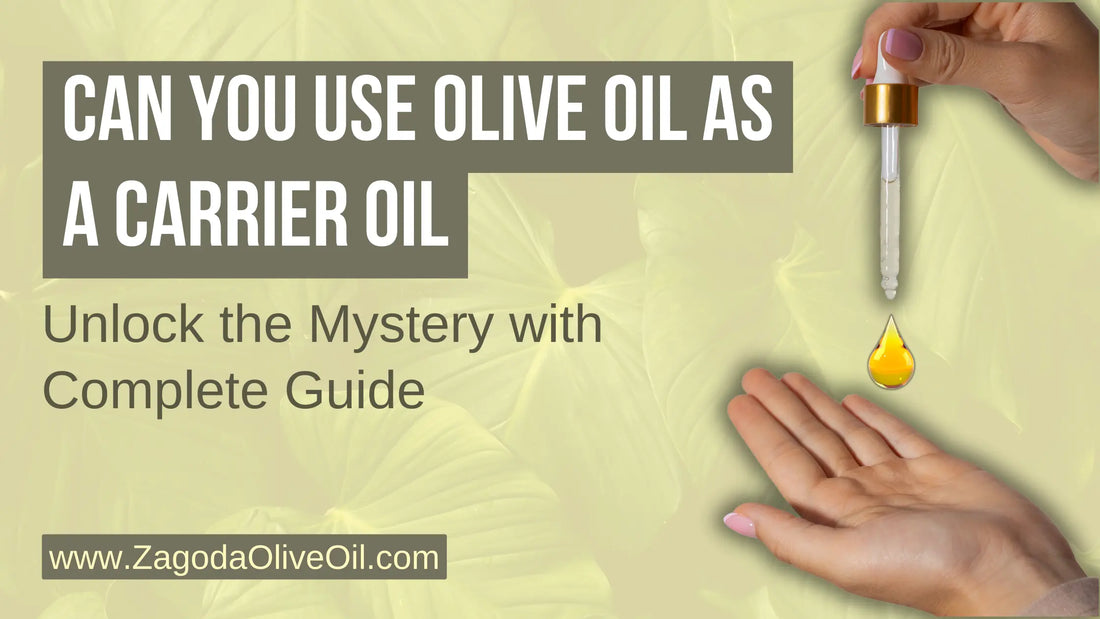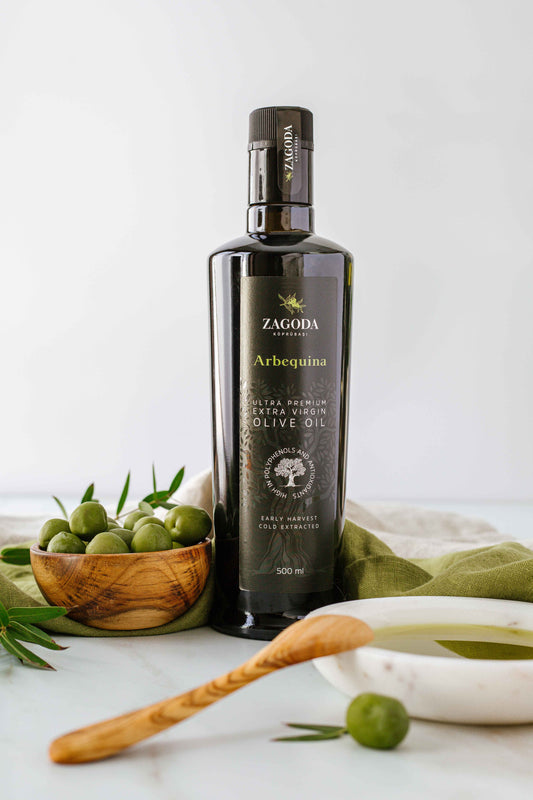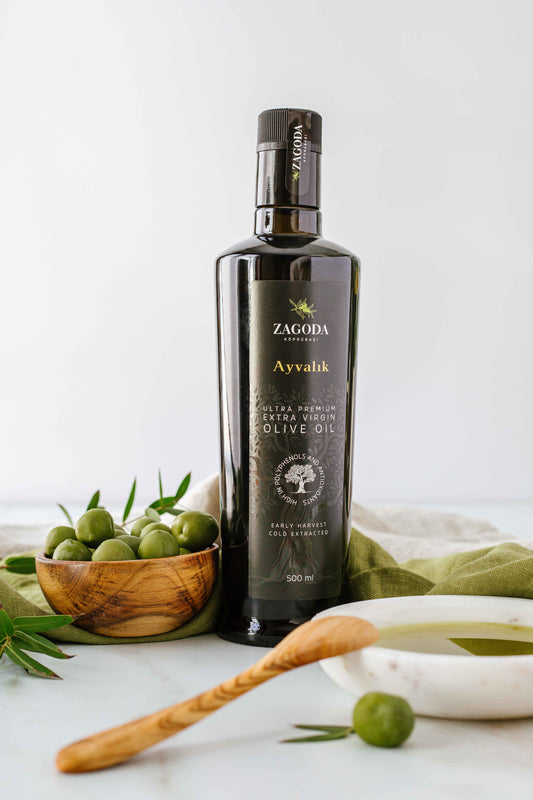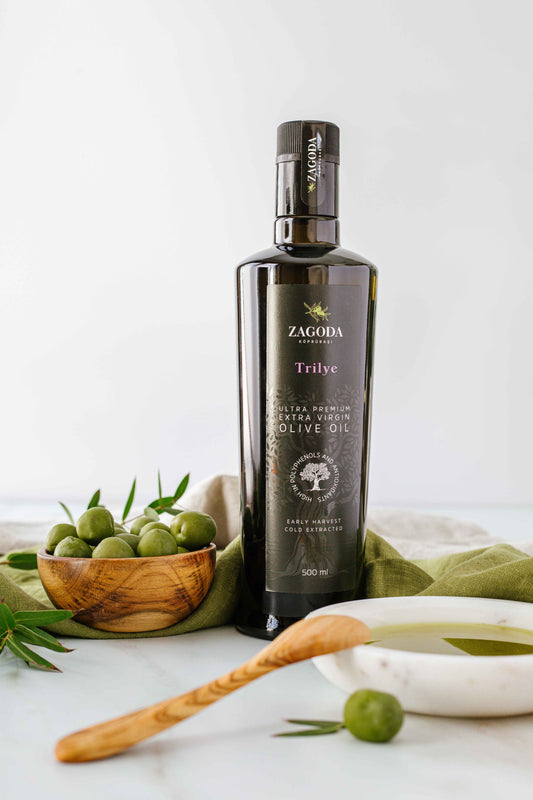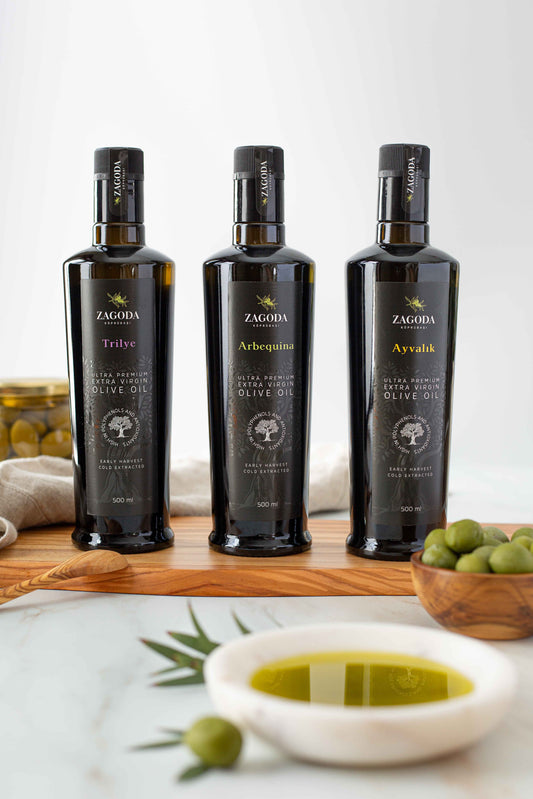When it comes to skincare, there are countless products available on the market. From cleansers to moisturizers, the options can be overwhelming. However, one often overlooked but highly effective ingredient is carrier oils.
These oils play a crucial role in skincare routines by diluting and enhancing the benefits of essential oils. In this article, we will delve into the world of carrier oils and specifically explore the benefits of using olive oil as a carrier oil for the skin.
Elevate your skincare routine with the nourishing power of premium olive oil. Don't miss out, grab your bottle now!
What is a Carrier Oil and Why is it Important?
Before we discuss the specific benefits of olive oil as a carrier oil, let's first understand what a carrier oil is and why it is important. A carrier oil is a neutral, usually plant-based oil that is used to dilute essential oils before applying them to the skin.
Essential oils are highly concentrated and can cause skin irritation if used directly. Carrier oils help reduce this risk by providing a gentle base for essential oils. They also help facilitate the absorption of essential oils into the skin, allowing for better efficacy.
Using a carrier oil is crucial for safe and effective use of essential oils. It helps prevent skin irritation and sensitization, ensuring that the potent properties of essential oils are delivered to the skin in a controlled manner. Carrier oils also provide nourishment and hydration to the skin, making them an excellent addition to any skincare routine.
Benefits of Using Olive Oil as a Carrier Oil for Skin
Now that we understand the importance of carrier oils, let's explore the specific benefits of using olive oil as a carrier oil for the skin. Olive oil is a versatile and widely available oil that has been used for centuries in skincare. Here are some of the key benefits:
- Moisturization: Olive oil is rich in fatty acids and antioxidants, making it an excellent moisturizer for the skin. It helps lock in moisture, keeping the skin hydrated and supple.
- Anti-aging Properties: The antioxidants present in olive oil help fight free radicals, reducing the signs of aging such as fine lines and wrinkles. It also promotes cell regeneration, giving the skin a youthful glow.
- Soothing and Calming: Olive oil has anti-inflammatory properties, making it ideal for soothing irritated or inflamed skin. It can help reduce redness and soothe conditions like eczema and psoriasis.
- Rich in Vitamins: Olive oil is packed with vitamins A, D, E, and K, which are essential for healthy skin. These vitamins nourish and protect the skin, improving its overall appearance and texture.
How to Use Olive Oil as a Carrier Oil for Face
Using olive oil as a carrier oil for the face is simple and effective. Here's a step-by-step guide:
- Choose a High-Quality Olive Oil: Opt for extra virgin olive oil, as it is the least processed and retains the highest amount of nutrients. Look for organic options for the best results.
- Perform a Patch Test: Before applying olive oil to your face, it's important to conduct a patch test to check for any adverse reactions. Apply a small amount of diluted olive oil to a small area of skin and monitor it for 24 hours.
- Dilute Essential Oils: Mix a few drops of your chosen essential oil with a tablespoon of olive oil. The exact ratio will depend on the essential oil and your skin's sensitivity. Start with a lower concentration and adjust as needed.
- Apply to Clean Skin: Gently massage the diluted mixture onto clean, dry skin. Focus on areas that require extra care or treatment. Avoid the eye area and any broken or irritated skin.
- Allow Absorption: Give your skin time to absorb the oils before applying any additional products. This will ensure maximum effectiveness and prevent the oils from rubbing off.
Remember, everyone's skin is unique, so it's important to listen to your skin's needs and adjust the concentration of essential oils accordingly. It's always better to start with a lower concentration and gradually increase if needed.
Using Olive Oil as a Carrier Oil for Specific Essential Oils - Rosemary Oil and Tea Tree Oil
Olive oil can be an excellent carrier oil for specific essential oils, such as rosemary oil and tea tree oil. Let's explore the benefits of using these combinations:
Rosemary Oil:
Rosemary oil is known for its stimulating and purifying properties. When combined with olive oil as a carrier oil, it can provide the following benefits:
- Scalp Health: Massaging a mixture of rosemary oil and olive oil onto the scalp can help improve blood circulation, promote hair growth, and prevent dandruff.
- Antibacterial Effects: Rosemary oil has antibacterial properties that can help cleanse the skin and reduce acne breakouts. Combining it with olive oil ensures safe and gentle application.
- Mental Clarity: Inhaling the aroma of rosemary oil can help improve focus, memory, and mental clarity. Using it as a carrier oil allows for easy inhalation and absorption.
Tea Tree Oil:
Tea tree oil is well-known for its antibacterial, antifungal, and anti-inflammatory properties. When used with olive oil as a carrier oil, it offers the following benefits:
- Acne Treatment: Tea tree oil can effectively combat acne-causing bacteria. Mixing it with olive oil helps prevent skin irritation and provides a soothing base for application.
- Skin Infections: The antifungal properties of tea tree oil make it effective against various skin infections, such as athlete's foot and nail fungus. Mixing it with olive oil ensures safe and controlled application.
- Hair and Scalp Care: Tea tree oil can help relieve itchy scalp and reduce dandruff. Combining it with olive oil provides a nourishing treatment for the hair and scalp.
Remember to always dilute essential oils with a carrier oil before using them on your skin. This will help prevent any adverse reactions and ensure safe and effective use.
The Best Carrier Oils to Mix with Essential Oils
While olive oil is an excellent carrier oil, there are other options available that can be mixed with essential oils for various skincare needs. Here are some of the best carrier oils:
- Jojoba Oil: Suitable for all skin types, jojoba oil closely resembles the skin's natural sebum, making it easily absorbed and non-greasy.
- Sweet Almond Oil: High in vitamin E and fatty acids, sweet almond oil nourishes and softens the skin. It is particularly beneficial for dry and sensitive skin.
- Grapeseed Oil: Lightweight and easily absorbed, grapeseed oil is rich in antioxidants and can help tighten and tone the skin. It is suitable for all skin types.
- Coconut Oil: Known for its moisturizing properties, coconut oil is a popular choice for body and hair care. However, it can be comedogenic for some people, so it's best to patch test before use.
Experiment with different carrier oils to find the ones that work best for your skin type and specific skincare needs. Each carrier oil offers unique benefits and can be tailored to address different concerns.
Can Olive Oil be Used as a Carrier Oil for Hair?
Yes, olive oil can be used as a carrier oil for the hair. Its moisturizing and nourishing properties make it a great choice for hair care. Here's how you can use olive oil as a carrier oil for your hair:
- Hot Oil Treatment: Warm a small amount of olive oil and massage it into your scalp and hair. Cover your hair with a shower cap and leave it on for 30 minutes to an hour. Rinse thoroughly and shampoo as usual.
- Hair Mask: Mix olive oil with other natural ingredients like honey or yogurt to create a nourishing hair mask. Apply the mixture to your hair, focusing on the ends. Leave it on for 30 minutes to an hour before rinsing.
Olive oil can help moisturize and condition the hair, making it softer, smoother, and more manageable. It can also help reduce frizz and promote hair growth.
However, it's important to note that olive oil may not be suitable for all hair types, especially if you have fine or oily hair. Patch test and adjust the amount used based on your hair's needs.
Other Oils That Can be Used as Carrier Oils
While olive oil is a popular and versatile carrier oil, there are several other oils that can be used as well. Here are a few options:
- Argan Oil: Known as "liquid gold," argan oil is rich in antioxidants and essential fatty acids. It is particularly beneficial for dry, damaged, or aging skin.
- Avocado Oil: Packed with vitamins and minerals, avocado oil deeply nourishes and moisturizes the skin. It is especially beneficial for dry and mature skin.
- Rosehip Oil: Rich in vitamins A and C, rosehip oil helps brighten the skin, reduce hyperpigmentation, and improve overall skin tone and texture.
- Sesame Oil: With its antibacterial and anti-inflammatory properties, sesame oil can help soothe irritated skin and protect against harmful UV rays.
These are just a few examples of carrier oils that can be used in skincare. Each oil has its own unique benefits and properties, so feel free to explore and find the ones that work best for your skin.
How Much Carrier Oil to Use with Essential Oils
The amount of carrier oil to use with essential oils depends on several factors, including the essential oil itself, your skin's sensitivity, and the desired concentration.
As a general guideline, a 2% dilution is commonly used for most adults. This means that for every 1 teaspoon (5 ml) of carrier oil, you should add approximately 6 drops of essential oil.
However, it's important to note that some essential oils are more potent and may require lower dilutions. For example, essential oils like peppermint or cinnamon should be used in lower concentrations due to their high potency.
On the other hand, milder essential oils like lavender or chamomile can be used in higher concentrations.
It's always best to start with a lower dilution and gradually increase if needed. Pay attention to your skin's reaction and adjust the concentration accordingly.
Remember, everyone's skin is different, so it's important to find the dilution that works best for you.
Can Olive Oil be Used as a Carrier Oil for Frankincense Oil?
Yes, olive oil can be used as a carrier oil for frankincense oil. Frankincense oil is renowned for its skincare benefits, including its ability to reduce the appearance of scars and wrinkles, promote cell regeneration, and soothe inflammation.
When combined with olive oil as a carrier oil, these benefits are enhanced and the oil can be safely applied to the skin.
To use olive oil as a carrier oil for frankincense oil, simply mix a few drops of frankincense oil with a tablespoon of olive oil. Adjust the concentration based on your skin's sensitivity and the desired effects. Apply the mixture to clean, dry skin and massage gently until absorbed.
Can I Use Extra Virgin Olive Oil as a Carrier Oil?
Yes, extra virgin olive oil can be used as a carrier oil. In fact, it is often recommended due to its high quality and nutrient-rich composition. Extra virgin olive oil is the least processed form of olive oil and retains the highest amount of beneficial compounds, making it an excellent choice for skincare.
When using extra virgin olive oil as a carrier oil, make sure to choose a high-quality, organic option for the best results. This will ensure that you are getting the full benefits of the oil without any harmful additives or chemicals.
What is the Best Carrier Oil to Mix with Essential Oils?
The best carrier oil to mix with essential oils depends on your specific skincare needs and preferences. Each carrier oil offers its own unique benefits and properties. Some popular choices include jojoba oil, sweet almond oil, grapeseed oil, and coconut oil.
Jojoba oil is suitable for all skin types and closely resembles the skin's natural sebum, making it easily absorbed and non-greasy. Sweet almond oil is rich in vitamin E and fatty acids, making it ideal for dry and sensitive skin.
Grapeseed oil is lightweight and easily absorbed, making it suitable for all skin types. Coconut oil is moisturizing and nourishing, but may be comedogenic for some individuals, so it's important to patch test before use.
Experiment with different carrier oils to find the ones that work best for your skin type and specific skincare needs. The key is to choose high-quality, organic options and listen to your skin's needs.
Conclusion: The Versatility and Benefits of Olive Oil as a Carrier Oil
In conclusion, olive oil is a versatile and highly beneficial carrier oil for skincare. Its moisturizing, anti-aging, and soothing properties make it an excellent choice for all skin types. When combined with essential oils, olive oil enhances their benefits and ensures safe and effective application.
Whether you're looking to improve your skincare routine, address specific skin concerns, or create your own DIY beauty products, olive oil as a carrier oil is a valuable ingredient to have in your arsenal. From facial treatments to hair care, its versatility knows no bounds.
Remember to always choose high-quality, organic olive oil for the best results. Conduct patch tests before using any new products on your skin and listen to your skin's needs. With the right approach, olive oil as a carrier oil can unlock the mystery of healthy, radiant skin.

